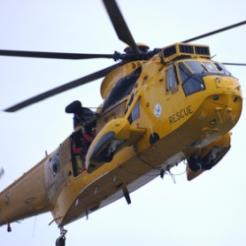Charities that are lucky enough to work on a popular cause – think kids, cancer, animals, and air ambulances – must take care not to exploit the generosity of the donating public in a morally questionable way, says David Philpott.
In my pretend-chaotic life, I have found myself over the course of these past seven days, ruminating on a moral dilemma of gargantuan proportions. It all started at the Family Business Red Ribbon Awards held in the Lancaster Hotel London and ended with a helicopter sweeping down to land on the freshly mown lawns of beautiful Cleve House in Wiltshire on a baking hot Friday afternoon.
To have been asked to present the Red Ribbon Award for Corporate Social Responsibility had indeed been a great honour. One takes these things on from time to time, conscious that they are in the diary, knowing that one will have to start focusing on it as the date draws closer, and relying totally on the event organisers and sponsors to say what one needs to be doing at what point in the proceedings.
My slot was no different to anyone else’s but I was acutely aware of the fact, that the awards ceremony itself was going to be preceded by a speech from Superchef Michel Roux and a medley of songs from the Military Wives Choir of South London.
Neither disappointed.
Monsieur Roux (a London geezer if truth be told), was both elegant and eloquent, wandering among the tables with the ease of a 1950s cabaret turn and delivering what Mark Twain might have called ‘the best off-the-cuff damn speech he had ever written’. The ladies - the public face of a thousand sleepless nights, days of bad news, days of no news and so little time with the husbands serving here, there and anywhere in the dusty backwaters of the planet – sang for their lives with a brilliant video backdrop of Gary Barlow et al.
Having mounted the stage accompanied by the delightful Deborah in her shimmering sequined dress and having looked out across an endless sea of tables – all glamour and glitter, and not a few diamonds I expect – this was after all the cream of Britain’s multi-million-pound family business sector – and having dispensed with the introductory remarks, I ratcheted-up the ante: “Tonight’s winner was not chosen because their corporate social responsibility policy made impressive reading in the annual report, nor was it because it kept their shareholders happy. Still less, was it because they had proven that by being charitable, they could somehow demonstrate that this was effective cause-related marketing that had worked its way through into the profit line. No!” – I declaimed like a demented preacher, “they were chosen because they do social responsibility simply because it is the right thing to do”.
Having it easy
Seven days later, standing with a colleague from another part of the country on the veranda-cum-patio at Cleve House as the sexy blue and yellow helicopter swept in to land, I joked: “This is how crop circles are made you know.” She smiled and paused before saying quite deliberately, “We really have it easy don’t we?” I must have looked quizzically at her for she went on, “Air ambulance fundraising. A big helicopter, men in uniform, a public appetite to give that seems to know no bounds……………….” It was, you see, an air ambulance fundraising garden party.
Reflecting on Alana’s comments as I drove home, I found that I had to agree with her. And then I began to ponder on the fact that just as with great power comes great responsibility, so with easy-ask fundraising – you know; children’s hospices, certain animal charities, and yes air ambulances – there is a moral obligation to make sure that we are only asking for what we need and not just amassing reserves.
My mind wandered - as it so often does - to the morally questionable plans that some air ambulance charities have, of launching 24/7 services when there is nearly a decade of evidence that proves there is no significant demand for this emergency service platform between the hours of 1am and 6am. Focused fundraising campaigns have been launched here and there through the local press, importuning people to help the charity save lives in the hours of darkness and fly around the clock. Alas, as so often is the case, fundraising is driving the charity rather than the cause and thus the donations that might have gone to other very worthy not-for-profits – homelessness charities, women’s refuges, children’s centres – struggle to survive or simply have to close down because their charity is not sexy enough – however deserving.
“We are preparing to meet the needs of the new Regional Trauma Networks by offering inter-hospital transfers at night” will no doubt be the collective retort of these, my sometimes colleagues. That may well be the case, but I have yet to see any evidence to justify such frippery with donors’ funding in an industry that is spending nigh on £100m of voluntary income to prop up the underfunded state emergency service.
As I pulled into a motorway service area, I thought again about my little speech to the family businesses at the Red Ribbon Awards. “They do it, because it’s the right thing to do,” I had said. Not a bad test for every board of trustees to apply to any strategic decision they make, however high-flying their ambitions might be.










